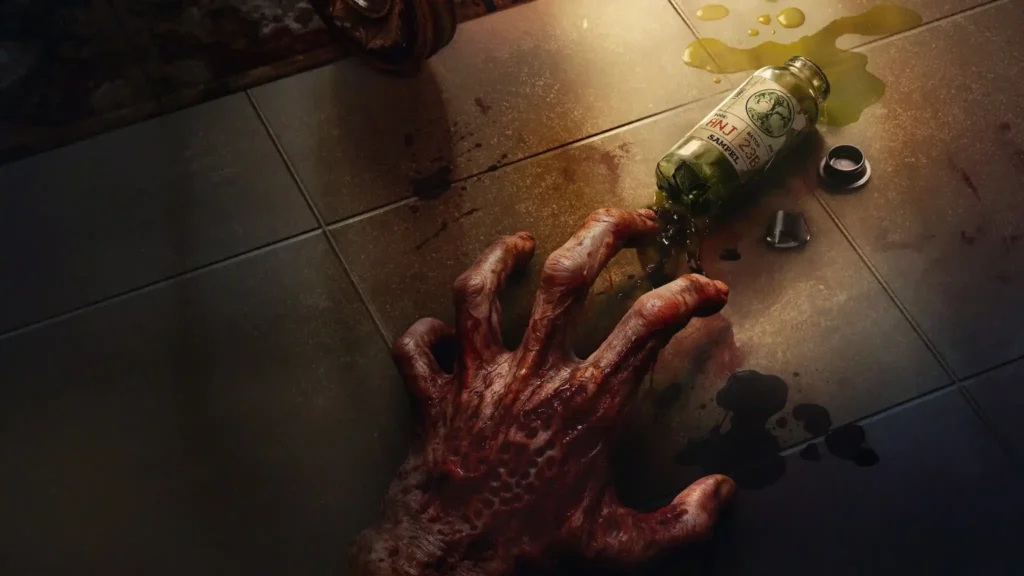
You can’t make zombies interesting in 2025. It’s impossible. The shambling undead in Kimo Stamboel’s Netflix streamer The Elixir are nothing you haven’t seen before. They can run like in 28 Years Later, they sound a bit like the clickers from The Last of Us, they eat people like… well, every zombie ever. None of this is the point. The trick is making everything around the zombies interesting. The setting. The characters and their fractious interpersonal dynamics. The squishy practical effects and gore. The Elixir is a good, albeit derivative zombie movie because it recognises the zombies are the least interesting thing about it.
Dysfunction is at the heart of this movie. Most of its characters are part of the same family, beneficiaries of a once-prosperous herbal remedy company that’s on the cusp of a lucrative merger with Big Pharma. They can’t stand each other, for the most part. The CEO patriarch is married to a much younger woman, Karina, who was the best friend of his daughter, Kenes, a workshy passenger princess who is divorcing her husband, Rudi, on account of his affair with a woman from the pharmaceutical company. Nes just about tolerates Rudi for the sake of their son, Han, but she has no time whatsoever for Karina, and very little for her layabout brother, Bang.
Wani Waras Herbal’s efforts to create an eternal youth elixir backfire considerably when the tonic turns out to be the genesis of a rapidly spreading zombie infection, which is refreshingly underexplored. There’s no heavy-handed lecturing about corporate greed, no scathing critique of herbal medicine; there isn’t even an explanation for how the tonic turns magical de-aging into zombification. This, I think, is for the better. A more plotty movie would have had worse pacing. As things stand, The Elixir runs two hours and devotes an hour and fifty minutes of that to a single protracted action sequence.

The meat of the story lives within that action sequence, though. Quickly, circumstances conspire to separate the family, with Nes and Bang ending up together while Rudi, Karina, and Han are elsewhere. Eventually, the latter group takes shelter in the home of Ningsih, the fiancée of a local cop trapped with his colleagues in the police station, tying everything together. Survival means working through everyone’s respective issues, and the pairings — a bickering brother and sister, a kid and his mother’s nemesis, etc. — are what give The Elixir a bit of characterful zing.
Stamboel contrives a couple of fun sequences, including a breathless crush that finds several characters in riot gear in the middle of a ravenous horde, but the neatest trick is how he ties them together, with various recognisable elements — a flatbed truck, say, or a specific legless zombie — being reused in a slightly different context down the line. It helps to reiterate that small-town vibe and keep the scale manageable, and the use of practical effects creates an enjoyably messy aesthetic. The only novel detail of these zombies is that they inexplicably fall into a trance when it starts raining, and even this is used quite creatively to build tension and surprise in a few of the set-pieces.
And this, I think, is the point of The Elixir. It’s a solid zombie movie that doesn’t really aspire to be anything else, which gives it a refreshingly stripped-back sense of efficiency. It’s only interested in delivering good zombie shenanigans, and it does that relentlessly for its entire runtime. Sure, they’re embellished by decent character drama and build to a bravely bleak climax, but fundamentally this is a movie about the simplest B-movie sensibilities, the joy of exaggerated effects and messy deaths and cleverly staged action. I enjoyed it, and I’ll forget about it entirely by tomorrow, and I don’t think that’s necessarily a bad thing at all.


